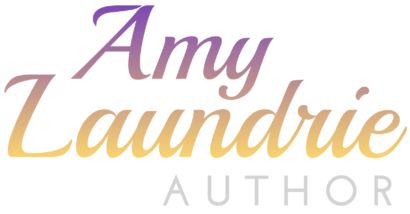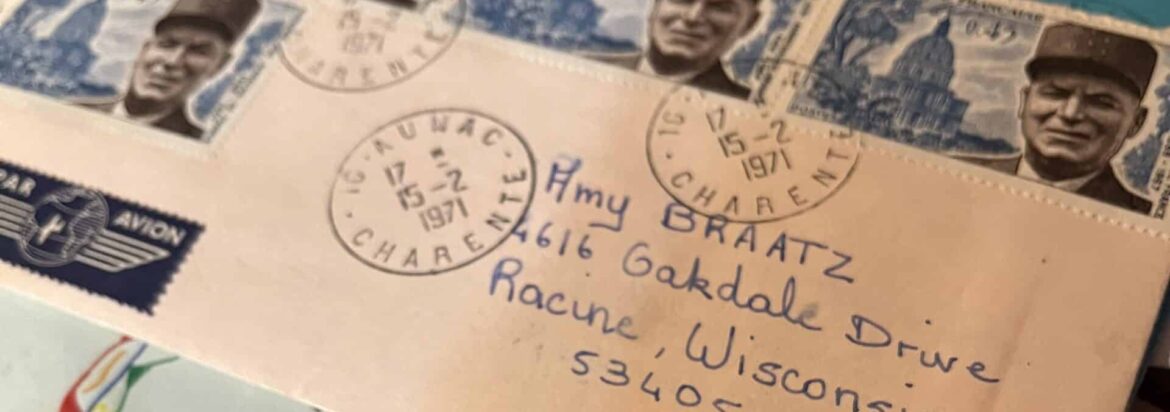I’m sorting through the bin of old letters I’ve saved and pull out a stack from elementary school. “Dear Amy, I love you. Do you love me? Circle yes or no.” Seeing the neatly penciled words written by David Onnick instantly brings me back to third grade. David and I competed in multiplication flashcard drills and spent time together at recess. We once helped round up the neighbor’s pigs which had gotten loose again and were running around the playground. We played baseball, tetherball, and encountered a skunk who raised its tail and successfully ran us off. Years melt away because of a single yellowed piece of paper.
Do third graders write love letters anymore or are they sending digital notes on Messenger? Will my grandchildren have treasured memories of their childhood?
I also treasure the letters our daughter sent us from The Gambia while she served in the Peace Corps. I’m glad the rural West African country made it difficult to communicate by phone or email, allowing me to have a record of her feelings and experiences.
Letters can hold great power, as Anna Quindlen explains in her book “Write for Your Life.” “I think of one set of letters that changed the American political landscape,” she writes, “the ones Eleanor Roosevelt found when unpacking Franklin’s bag, the ones that told her that her husband and her pretty young assistant, Lucy Mercer, were in love. I wonder what ever happened to those letters…Whatever those letters contained, the effect was considerable. For the marriage, a kind of death knell; for the country, an activist First Lady who conspicuously felt liberated from being a devoted helpmate.”
Quindlen also devotes pages to the importance of “The Diary of Anne Frank” and the poignancy of one of Anne’s lines: “I want to go on living even after my death.” Anne Frank’s letters allowed her to do exactly that.
Letters can bring history to life. If people hadn’t saved letters, books like Joanna L. Stratton’s “Pioneer Women,” which gives readers an inside view of the experiences of women who emigrated to Kansas in the mid-1800s, wouldn’t have been possible. Women wrote of both the gritty hardships and the joys of their lives. We get to join them while reading lines such as these written by Catherine Cavender. “Our joy rides were horseback rides! Wild dashes across the prairie, the wind painting our cheek with nature’s red!”
“The Letters of E. B. White” has long been a favorite book of mine. I especially love White’s descriptions of time spent with his beloved dog and the pigs and geese he raised. This excerpt, from a November 18, 1931 letter written to the American author and humorist James Thurber, shows White’s writing skills but also allows me a personal view of him. “I get a pig so we won’t have to buy hams, and then I rebuild my barn around the pig at the expense of perhaps a thousand hams, or more than you and I could eat (with mustard) during the rest of our natural lives, if you can call mine a natural life.”
E. B. White understood the importance of letters. He wrote, “A man who publishes his letters becomes nudist—nothing shields him from the world’s gaze except his bare skin.”
I return to the bin and pull out another bundle of possibly 50 letters, all with foreign stamps. My high school French teacher had arranged for us to write to pen pals. Martine Villechalane and I quickly bonded. Distance might have separated us, but we wrote (clumsily at times because of the language difference) about similar joys and worries, mostly involving boys, clothes, friends, and the possibility that we could meet one day. “Today, the weather is fine and I wear a bermuda. What do you wear? Can you come in France soon?” Though we never met, her letters made me feel like I knew her.
Distance also separates me from my elderly relative, who lives in Norway. Despite emailing him and his wife several times, I haven’t heard from them for months. I’d like to check in and a phone call isn’t an option. I head to my desk, grab pen and paper, and begin.


2 Replies to “The Power of Letters”
Amy,
Thanks for sharing your message. Writing also challenges our minds and we can do it without spell check.
I recently went through some old notes from my nieces and gave them back to them. They were so excited to see how their penmanship improved and tried to remember long lost stories. Their smiles made it all worth it to get their treasures back.
Hi Anita,
I imagine your nieces were interested in seeing the letters they’d sent you. I reminded my daughter that I had a folder filled with letters she wrote while in Africa, and she mentioned wanting to read them someday.
I’m looking forward to seeing you soon.
Amy